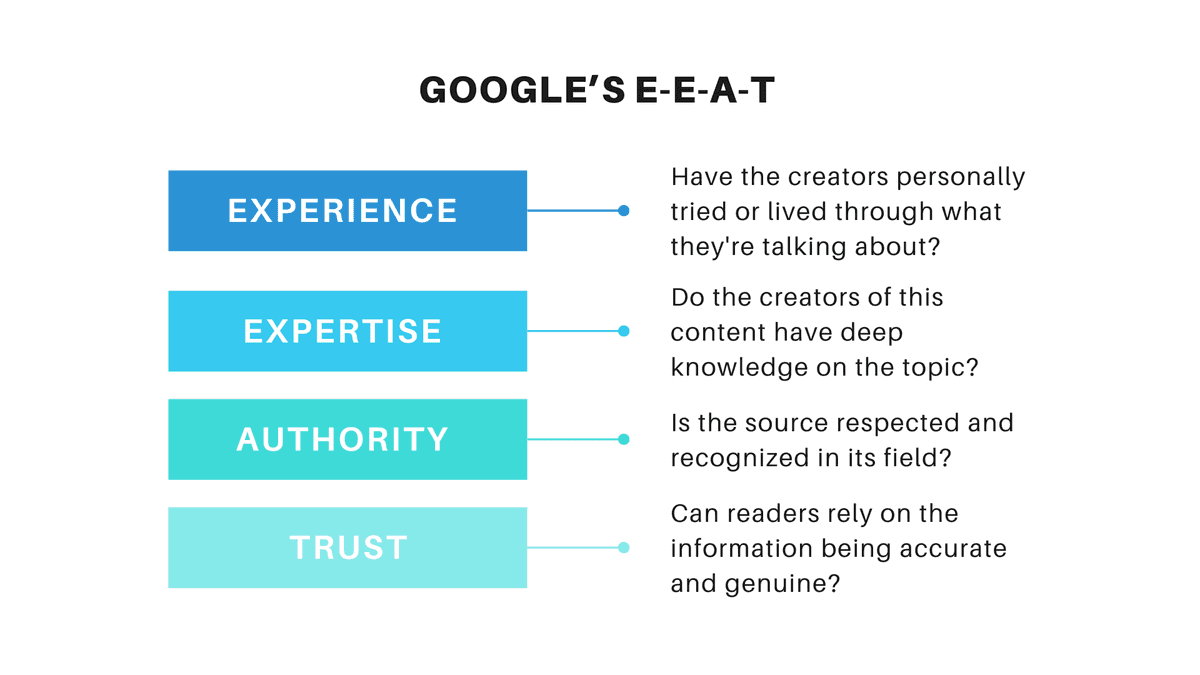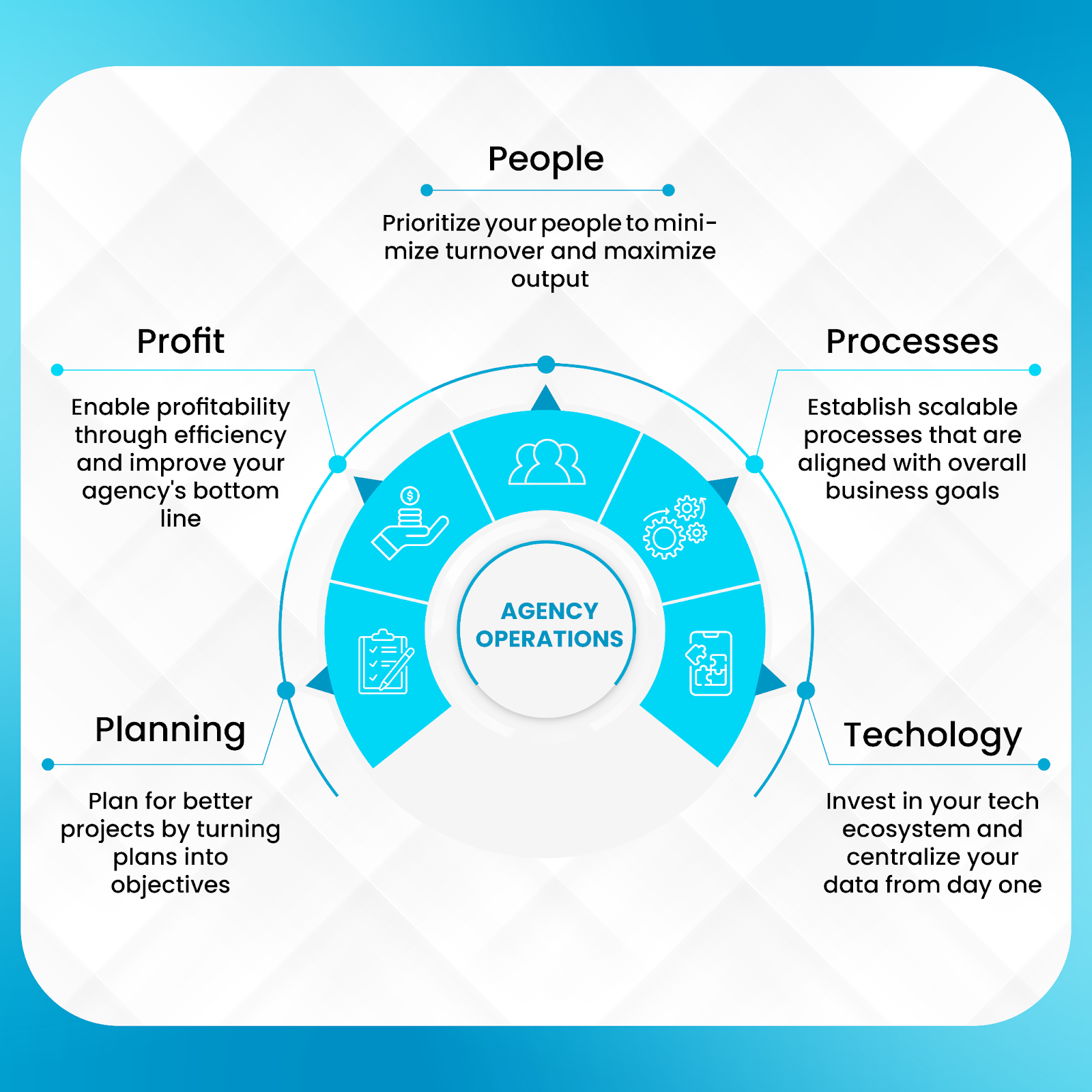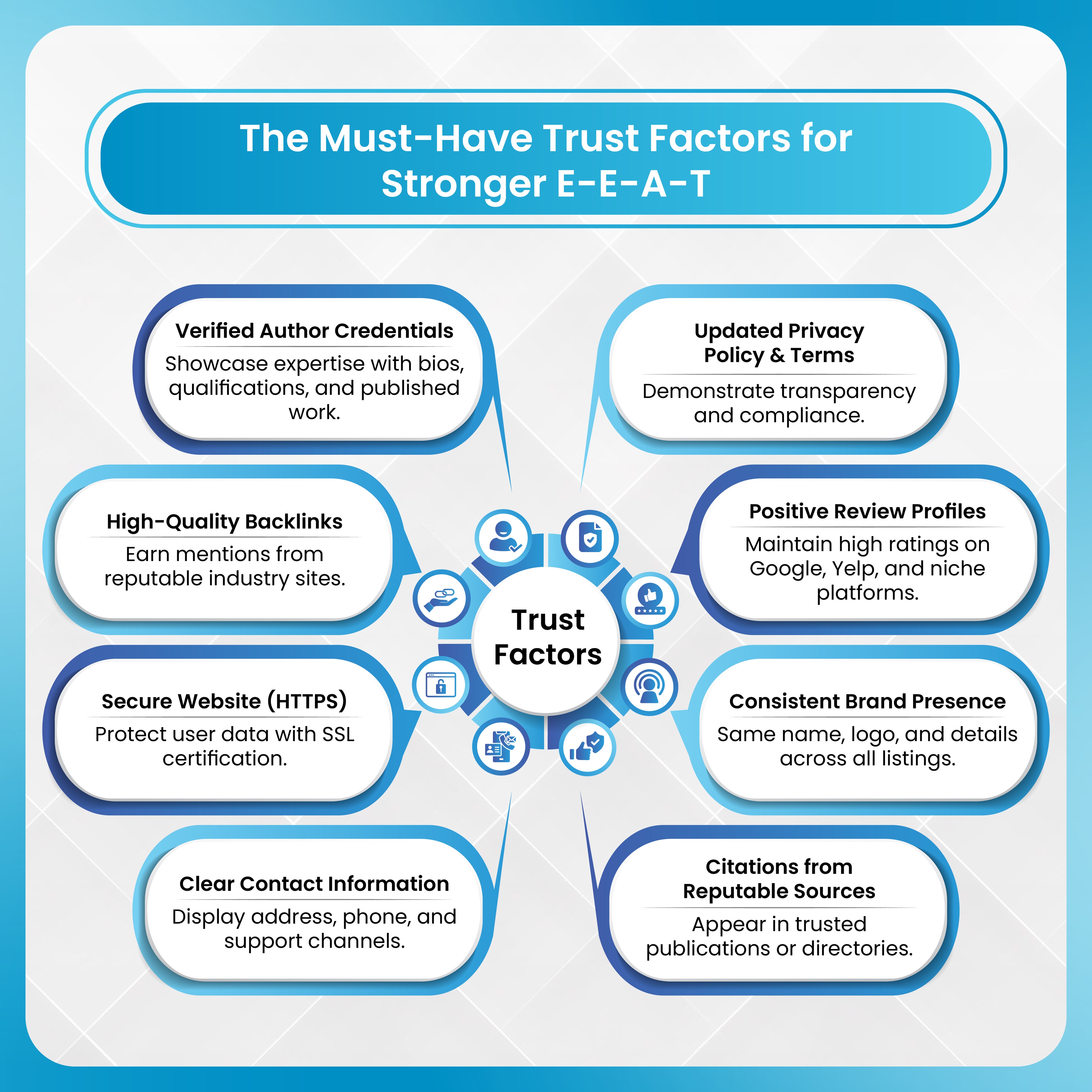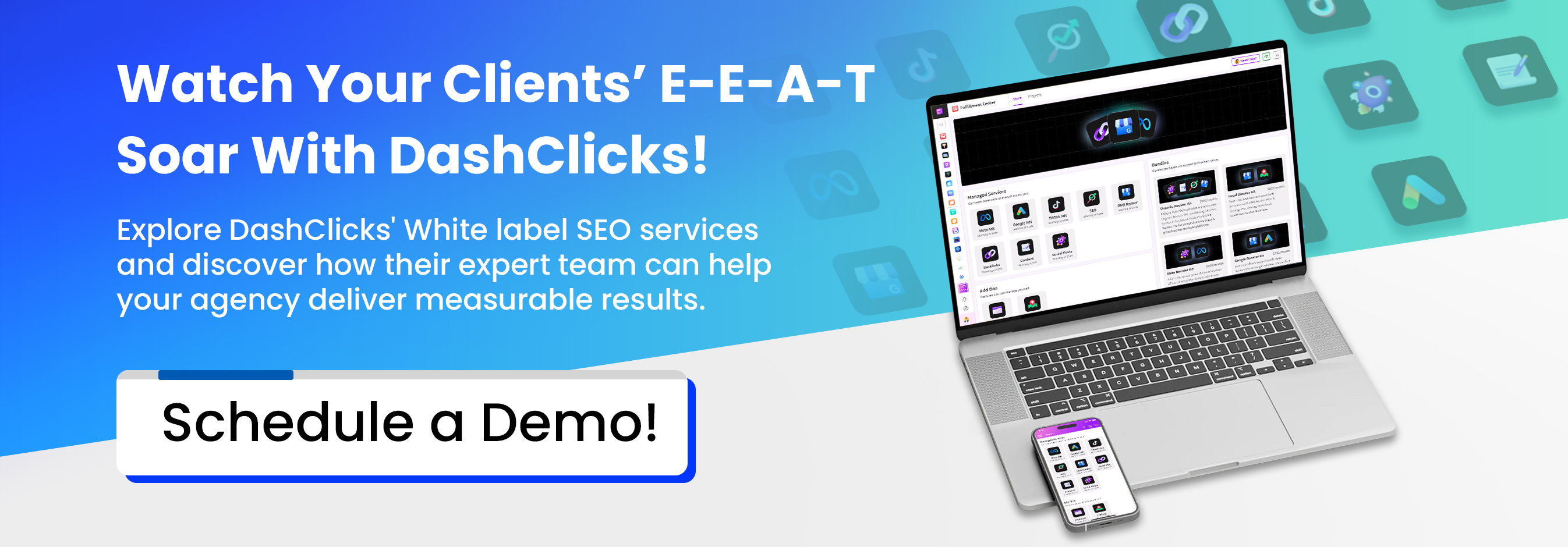Running a successful digital marketing agency means staying ahead of Google's quality standards. But here's the challenge: your clients need high E-E-A-T scores to rank well, and you need to deliver those results without stretching your team too thin.
Google's E-E-A-T guidelines have become more important than ever. Research shows that 93% of all web traffic comes from search engines, making quality content and strong trust signals crucial for business success. For agencies managing multiple clients across different industries, a white label SEO partnership provides the expertise and resources needed to meet these standards consistently.
White label SEO services offer a smart solution. They help agencies improve their clients' Experience, Expertise, Authoritativeness, and Trustworthiness signals while maintaining focus on business growth. This approach lets you provide expert-level SEO work without hiring specialist teams or investing in expensive tools.
This post explores how white label SEO services help agencies improve E-E-A-T scores for their clients. We'll cover practical strategies, measurable results, and real ways to show client impact through better search performance.
The Evolving Importance of E‑E‑A‑T for Rankings and Conversions
E-E-A-T in SEO stands for Experience, Expertise, Authoritativeness, and Trustworthiness. Google uses these quality signals to evaluate content and websites, especially for topics that could impact people's health, finances, or well-being.
Experience means showing real-world knowledge about a topic. This includes first-hand testing of products, personal stories, or practical insights that only come from actual use.
Expertise involves demonstrating deep knowledge in a specific field. This could mean having professional credentials, years of practice, or recognized skills in an industry.
Authoritativeness refers to being seen as a go-to source in your field. This includes getting mentions from other respected websites, earning backlinks from industry leaders, and building a strong reputation over time.
Trustworthiness covers how reliable and honest your content appears. This includes accurate information, clear sourcing, transparent business practices, and positive user reviews.

Image Source: Exabytes
While E-E-A-T doesn't directly determine search rankings, it strongly influences them. Google's quality raters use these signals to evaluate websites, and this feedback helps improve search algorithms. Sites with strong E-E-A-T signals typically see better search visibility and higher click-through rates.
E‑E‑A‑T initially applied primarily to YMYL industries—finance, healthcare, legal services, and safety-critical topics. Today, these principles extend across all content categories. E-commerce product reviews, B2B software comparisons, and local service recommendations all benefit from strong E‑E‑A‑T implementation.
Research demonstrates measurable ranking improvements for content with enhanced E‑E‑A‑T signals. Marketers say improving E-E-A-T signals, such as detailed author bios, has positively impacted their organic performance.
Strong E‑E‑A‑T implementation creates a multiplier effect across client campaigns. Higher search rankings drive increased visibility, while enhanced credibility improves user trust and conversion rates. This dual benefit makes E‑E‑A‑T optimization essential for comprehensive SEO strategies.
The Agency Dilemma: Delivering E‑E‑A‑T at Scale
Most agencies face similar obstacles when trying to improve E-E-A-T scores for clients. These challenges often prevent even well-intentioned teams from delivering the results clients expect.
- Limited Subject Matter Expertise: Agencies typically work with clients across different industries. A team might handle SEO for a law firm, a medical practice, and a financial advisor all in the same week. Each industry requires specialized knowledge to create content that demonstrates real expertise.
- Time Constraints: Building strong E-E-A-T signals takes considerable effort. This includes researching topics thoroughly, finding credible sources, creating detailed author bios, and developing comprehensive content strategies. Most agency teams already handle multiple priorities and struggle to dedicate enough time to these detailed tasks.
- Resource Limitations: Effective E-E-A-T optimization requires specific tools and skills. This might include citation databases, fact-checking resources, content analysis software, and team members who understand industry-specific requirements. Smaller agencies often can't justify these investments for occasional use.
- Scaling Difficulties: What works for one client might not work for another. A strategy that improves E-E-A-T for a local restaurant won't necessarily help a software company. Agencies need flexible approaches that can adapt to different industries and client needs.
Quality control presents another significant hurdle. Maintaining consistent E‑E‑A‑T standards across different industries, content types, and client requirements demands systematic processes that most agencies struggle to implement effectively.
In-house efforts often produce inconsistent results. Content quality varies based on available expertise. Author credentials may lack industry credibility. Citation practices become inconsistent across different projects. These gaps undermine overall campaign effectiveness and client satisfaction.
Resource allocation becomes increasingly difficult as client portfolios expand. Agencies must choose between hiring specialized experts for each industry or accepting lower-quality output across multiple sectors.
These challenges become more complex as agencies grow. A team managing 15+ clients simultaneously often can't provide the specialized attention each account needs for strong E-E-A-T performance.
Why White Label SEO Services Are a Game-Changer for Agencies?
White label SEO partnership solves many common agency challenges while opening new growth opportunities. These services let agencies access specialized expertise and resources without the overhead costs of building internal teams.
1. Expand Services Without Overhead
A white label SEO partner eliminates the need for extensive in-house hiring and tool investments. The average in-house SEO specialist costs $65,000 annually, plus benefits and training expenses. SEO tools add another $15,000-30,000 per year. White label SEO services provide access to entire teams and premium toolsets for a fraction of these costs.
Cost analysis reveals significant savings opportunities. Agencies serving 20+ clients would need 3-4 in-house specialists to maintain quality standards. Total annual costs exceed $250,000, including salaries, benefits, tools, and training. Comparable white label SEO services typically cost 40-60% less while providing superior expertise depth.
Budget flexibility improves dramatically with white label models. Agencies can scale services up or down based on client needs without fixed salary commitments. Project-based pricing allows for better margin control and client-specific service adjustments.
2. Access Specialized Expertise
White label SEO providers maintain teams of industry-specific experts across multiple verticals. Healthcare specialists understand medical terminology and regulatory requirements. Financial experts navigate compliance complexities. Technology writers possess technical depth and industry knowledge.
Access to premium tools represents another significant advantage. Enterprise-level keyword research platforms, content analysis software, and competitor intelligence tools become available without direct investment. These tools often cost $50,000+ annually for comprehensive access.
Industry research supports white label adoption trends. In 2023, white label SEO services accounted for 22% of agency revenue.
3. Scale Client Services
White label SEO enables rapid client portfolio expansion without overwhelming internal teams. Agencies can accept new clients immediately, knowing expert support is available for implementation.
Capacity planning becomes more predictable with white label SEO partnerships. Instead of estimating internal resource availability, agencies can rely on partner capacity to handle fluctuating workloads and seasonal demand spikes.
Client onboarding accelerates significantly. A white label SEO agency often has established processes, templates, and workflows that reduce project startup time from weeks to days.
Instead of trying to become experts in every aspect of SEO, agencies can concentrate on what they do best. This might be client management, strategy development, or specific marketing channels.

The financial impact is significant. Agencies using white label services report average revenue increases of 25-35% within their first year of partnership. They can serve more clients, offer expanded services, and maintain higher profit margins.
How a White Label SEO Agency Improves E-E-A-T Scores?
Professional white label SEO providers use specific strategies to strengthen each component of E-E-A-T. These approaches go beyond basic SEO to address Google's quality guidelines directly.
1. Enhanced Content Quality
White label SEO teams collaborate with industry experts to create content that demonstrates real knowledge. This includes interviewing professionals, citing academic research, and providing detailed explanations that show deep understanding.
Content development follows rigorous research protocols. Primary source verification ensures accuracy. Expert interviews add first-hand insights. Industry data integration provides statistical support. This comprehensive approach creates content that demonstrates genuine expertise and authority.
For example, a white label SEO provider working on a medical client's website might partner with licensed physicians to review content accuracy. They ensure all health information meets medical standards and includes proper citations from peer-reviewed sources.
2. Strategic Keyword Research
Advanced white label SEO services use AI-powered tools to identify keywords that match user intent while supporting E-E-A-T goals. This goes beyond search volume to consider topics that allow clients to demonstrate expertise and authority. These tools analyze search behavior patterns, competitor strategies, and user journey mapping to identify optimal targeting opportunities.
The white label SEO providers research and integrate semantic keywords, long-tail variations, and question keywords to build topical authority and capture specific user intents.
3. Authority Building Through Links
White label SEO providers strengthen backlink profiles using ethical, relationship-driven strategies that prioritize long-term authority over short-term gains.
They secure guest posts on reputable, industry-recognized publications and provide expert commentary in trade journals to position clients as thought leaders. Digital PR campaigns amplify these authority signals, while industry award submissions, conference speaking engagements, and media interviews further showcase subject matter expertise.
By focusing on ethical link building practices, these providers ensure sustainable results. They cultivate lasting relationships with trusted industry publishers, engage in value-first outreach to build genuine connections, and maintain a relentless commitment to high-quality content that naturally attracts links—avoiding manipulative or spammy tactics entirely.
4. Trust Signal Optimization
White label SEO teams boost credibility by systematically implementing on-page trust signals that benefit both users and search engines. This includes structured data markup, optimized author bios, accurate business information across directories, and positive review profiles.
Comprehensive trust elements—such as clear contact details, transparent privacy policies, and credential-rich author bios—reinforce business legitimacy and build user confidence. Structured data like organization schema, author markup, and review schema connect content to verified sources and display social proof.

To maintain accuracy, teams apply fact-checking protocols, primary source verification, and expert reviews, supported by regular content audits. Transparent navigation, informative “About Us” pages, and regularly updated contact details further enhance credibility.
Advanced schema integration—such as FAQ markup for direct answers, review schema for trust signals, and author structured data for expertise—ensures measurable improvements in both perception and rankings.
The results are measurable. Clients working with experienced white label providers typically see 20-40% improvements in organic search visibility within 6-12 months.
Measuring E-E-A-T Impact: Key Metrics for Success
Tracking E-E-A-T improvements requires monitoring both direct SEO metrics and broader trust signals. Research shows that websites with strong E-E-A-T signals see average conversion rate improvements of 15-25% compared to sites with weaker trust indicators.
White label SEO company typically focuses on several key performance indicators -
- Content Quality Metrics: These include increases in page views, time spent reading articles, and social shares from industry professionals. Higher engagement suggests content is resonating with knowledgeable audiences.
- Search Visibility Growth: This covers improvements in featured snippet appearances, knowledge panel displays, and top-three rankings for competitive keywords. These positions often go to websites with strong E-E-A-T signals.
- User Engagement Indicators: Key metrics include longer time on page, lower bounce rates, and higher pages per session. Users tend to engage more deeply with content they trust and find valuable.
- Conversion Performance: This includes lead generation improvements, form submission increases, and sales growth tied to organic search traffic. Trust signals directly impact user willingness to take action.
- Reputation Metrics: These cover review rating improvements, brand mention increases, and social media engagement growth. Strong E-E-A-T often correlates with better overall brand perception.
How DashClicks Enhances E-E-A-T Through White Label SEO?
DashClicks provides comprehensive white label SEO services specifically designed to help agencies improve their clients' E-E-A-T scores. Their platform combines advanced SEO tools with expert fulfillment services, making it easier for agencies to deliver high-quality results consistently.
The DashClicks team includes SEO specialists, content creators, and digital marketing experts who understand Google's quality guidelines. They work directly with agency clients to develop content strategies that demonstrate real expertise and build online authority. Their systematic approach includes thorough keyword research, competitor analysis, and content optimization that addresses all four E-E-A-T components.
What sets DashClicks apart is its focus on measurable results. Their platform provides detailed reporting tools that track improvements in search visibility, user engagement, and conversion performance. Agencies can show clients exactly how white label SEO services impact their online presence and business growth.
DashClicks also offers comprehensive training and support to help agencies understand E-E-A-T optimization. This ensures agency teams can communicate value effectively to clients and contribute to strategy development. With over 1,500 verified reviews averaging 4.9 stars, DashClicks has proven its ability to deliver consistent results for marketing agencies nationwide.
Building Long-Term E-E-A-T Success
White label SEO services offer more than temporary ranking improvements. They provide agencies with the expertise and resources needed to build lasting online authority for clients across different industries.
The key is choosing white label partners who understand that E-E-A-T optimization requires ongoing effort and specialized knowledge. Quick fixes and generic approaches won't deliver the trust signals that Google values most.
Successful agencies use white label SEO to focus on their core strengths while ensuring clients receive expert-level optimization services. This approach leads to better client results, higher retention rates, and sustainable business growth.
As search engines continue emphasizing content quality and user trust, E-E-A-T signals will become even more important. Agencies that invest in proper white label partnerships now will be better positioned to serve clients effectively in an increasingly competitive digital landscape.



.svg)
.jpg)
.svg)
.svg)
.svg)
.svg)
.svg)

.svg)




.svg)
.svg)
.svg)
.svg)
.svg)